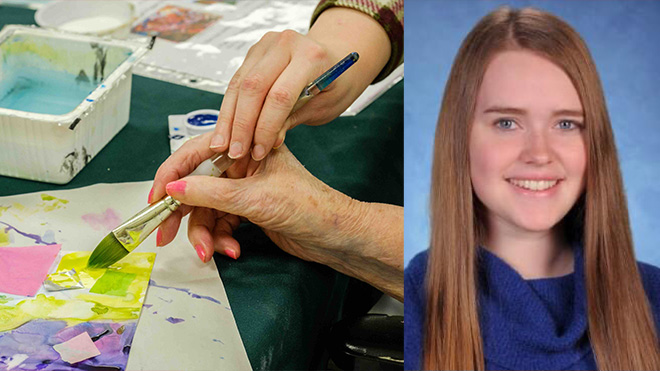Data-focused psychology student analyzes the implementation of person-centered activities to benefit nursing home residents’ well-being
Cassie Keiser ‘25 researches the barriers and facilitators of implementation of intervention activities on people living with dementia, as well as on the staff that help them, in nursing homes.

Data-focused psychology student analyzes the implementation of person-centered activities to benefit nursing home residents’ well-being
Cassie Keiser, a junior majoring in Psychology and Data Analytics with a minor in Marketing, came into college looking for a way to combine her two degrees. She didn’t have to wait long: a gerontology “filler” class that she took during her freshman year with doctoral student Miranda Kunkel propelled her to become an Undergraduate Summer Scholar (USS) in charge of her own research project.
With Kunkel’s encouragement, Keiser joined a research team, led by professor of gerontology Katherine Abbott, that was focused on implementing evidence-based Individualized Positive Psychosocial Interaction (IPPI) in nursing homes. The goal of the research was to increase the well-being of everyone, including the nursing home direct care staff.
Having always liked analyzing data, therefore, Keiser’s role was to analyze how IPPI is being implemented as well as the barriers and facilitators to implementation.
According to the published research, IPPI guides short, positive interactions that are based on the resident’s leisure and personal care preferences. These activities are administered by the resident’s direct caregiver through simple steps:
- Caregivers determine the resident's preferences for leisure and connect them directly as specific IPPI activities for that resident
- Using a virtual coaching model and training, caregivers incorporate the interventions meaningfully into the patient’s daily care in order to enhance workers’ dementia communication skills and orient them to the use of simple “plug and play” resources
“IPPI involves short, personalized, ten-minute activities, so it doesn't take a whole lot of time,” said Keiser. “They perform IPPI with a person living with dementia to decrease their communications of distress and increase their well-being.”
An example of an IPPI activity could include taking the resident outside if that is one of their preferences. This involves introducing the activity to the resident, asking questions concerning the activity (e.g., what do you like about sitting outside?), and encouraging the resident to participate in the activity.
Keiser works closely with her advisor, Prof. Abbott, as well as the rest of the research team to figure out how to help nursing homes adopt IPPI. She is currently writing a manuscript for a special-issue article that will be submitted for publication.
“IPPI is obviously great for the person living with dementia, but it's also great for the staff because less distress for their residents makes less stress for them,” said Keiser. “Everyone's happier.”
Abbott is also the executive director of Miami’s Scripps Gerontology Center, one of the nation's top centers for research in aging. Keiser expects her research to have a “bottom-up” or “trickle” effect, in which it would slowly start to build stronger communications for those in nursing homes. She is hoping to present her findings in the future at the Ohio Association of Gerontology Education Conference.
Keiser has yet to determine exactly what she wishes to pursue after college, but she does encourage students to pursue their passions.
“Nothing is ever wasted,” she said. “Because everything you go through shapes you. So eventually I'll get to where I'm supposed to be, and it'll be fine. And that the rollercoaster along the way is just for fun.”